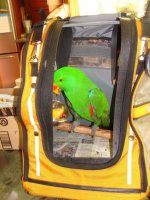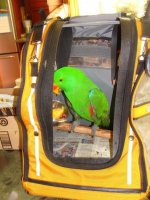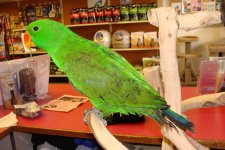Hi,
I have a 7 1/2 year old male Eclectus that was abaondoned at a pet store. I socialized him and his 1st words were "I love you" to me while I was helping my friend out who owned the pet store when he was about 7 months old. I ended up adopting him. I previously had a female eclectic that is now 17 yrs that my sister in law has.
We all live in southern Oregon. E first was hormonal about 3 years ago in the spring and tried to bite for several months. then he returned to his sweet easy to handle self. Recently we took care of a friend's biting male Amazon for week after these friends keep E for two weeks. Since this Amazon left (cages were side to side upstairs in south facing window] E has returned to biting.
I recognize that this is hormonal. Read in another blog that 24 hour sun light for full spectrum light would stop egg laying in females. I am wondering if this also works for males hormonal behavior (Yes, I know males do not lay eggs)? I do not want to wait for the several months it took E to return to being his sweet self. I will try to attach a picture.
I have a 7 1/2 year old male Eclectus that was abaondoned at a pet store. I socialized him and his 1st words were "I love you" to me while I was helping my friend out who owned the pet store when he was about 7 months old. I ended up adopting him. I previously had a female eclectic that is now 17 yrs that my sister in law has.
We all live in southern Oregon. E first was hormonal about 3 years ago in the spring and tried to bite for several months. then he returned to his sweet easy to handle self. Recently we took care of a friend's biting male Amazon for week after these friends keep E for two weeks. Since this Amazon left (cages were side to side upstairs in south facing window] E has returned to biting.
I recognize that this is hormonal. Read in another blog that 24 hour sun light for full spectrum light would stop egg laying in females. I am wondering if this also works for males hormonal behavior (Yes, I know males do not lay eggs)? I do not want to wait for the several months it took E to return to being his sweet self. I will try to attach a picture.

Attachments
Last edited by a moderator:

![photo 4[5].jpg](/data/attachments/11/11534-07910a4ff47033179317af30a2005ed4.jpg)


